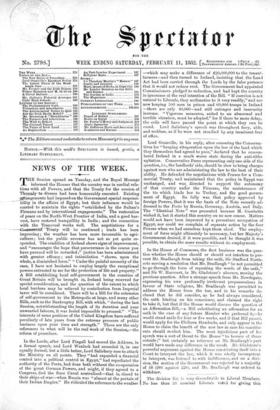In the House of Commons, the first business was the
ques- tion whether the House should or should not interfere to pre- vent Mr. Bradlaugh from taking the oath, Sir Stafford North- cote moving a resolution that Mr. Bradlaugh " be not permitted to go through the form of repeating the words of the oath," and Sir W. Harcourt, in Mr. Gladstone's absence, moving the previous question. After a strange speech from Mr. Newdegate, expressing his own profoundly irrelevant prepossessions in favour of State religions, Mr. Bradlaugh was permitted to address the House from the bar, and in his remarks de- clared that he did consider, as he had always considered, the oath binding on his conscience, and claimed the right to take it, but that if the House would discuss the question of an Affirmation Bill,—a Bill substituting an affirmation for an oath in the case of any future Member who preferred it,—he would stand aside for four or five weeks, and if that Bill passed, would apply for the Chiltern Hundreds, and only appear in the House to claim the benefit of the new law in case his constitu- ents should re-elect him. The most injudicious part of his speech was a sort of threat to the House " to beware of those outside ;" but certainly no reticence on Mr. Bradlaugh's part would have made any difference in the result. Mr. Gladstone's powerful argument against the House constituting itself into a Court to interpret the law, which it was wholly incompetent to interpret, was listened to with indifference, and on a divi- sion, the motion of the Government was rejected by a majority of 58 (286 against 228), and Mr. Bradlaugh was ordered to withdraw.














































